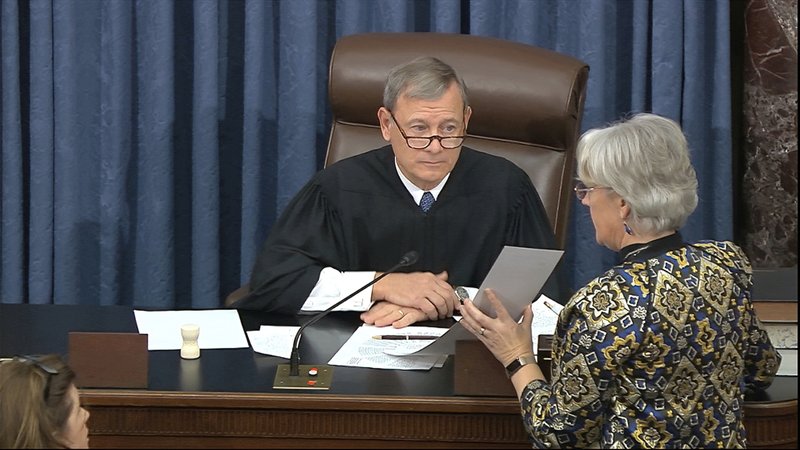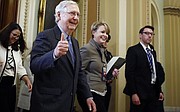WASHINGTON -- By a 51-49 vote late Friday, the Senate rejected Democratic demands to summon witnesses for President Donald Trump's impeachment trial, all but ensuring Trump's acquittal on charges that he abused his power and obstructed Congress.
But senators delayed a final vote on his fate until after Monday's caucuses in Iowa and after Tuesday's State of the Union address. Democrats also forced a series of new procedural votes late Friday to call former national security adviser John Bolton and acting White House Chief of Staff Mick Mulvaney, among others, but all were rejected.
The trial is scheduled to resume Monday for final arguments, with time Monday and Tuesday for senators to speak. The final voting is planned for 4 p.m. Wednesday, and the Senate has nowhere near the two-thirds majority needed for Trump's conviction and removal from office.
Some Republicans said Trump's expected acquittal is justified and inevitable.
[Video not showing up above? Click here to watch » https://www.youtube.com/watch?v=HhdK_5yKFrM]
"The sooner the better for the country," said Sen. Lindsey Graham, R-S.C. "Let's turn the page."
Without the four Republican votes the Democrats needed, this becomes the first impeachment trial without witnesses.
"If you are persuaded that he did it, why do you need more witnesses?" argued Sen. Lamar Alexander, R-Tenn., a critical swing vote. "The country is not going to accept being told that they can't elect the president they want to elect in the week the election starts by a majority for a merely inappropriate telephone call or action."
Sen. Lisa Murkowski, R-Alaska, issued a statement shortly after Alexander's. She criticized both houses of Congress, arguing that additional witnesses would only extend the House's "partisan" impeachment process, but also that the Senate trial had not been fair.
"It is sad for me to admit that, as an institution, the Congress has failed," she added.
Murkowski also said she voted against hearing from witnesses because a vote in favor would have resulted in a 50-50 tie, and she did not want to drag Chief Justice John Roberts into a partisan issue. Roberts, in the rare role of presiding over the impeachment trial, said late Friday that his breaking such a tie would be "inappropriate."
Sens. Mitt Romney, R-Utah, and Susan Collins, R-Maine, were the only two Republicans to break ranks with their party and voted with Democrats on Friday. Matt Schlapp -- the chairman of the American Conservative Union, which hosts the annual Conservative Political Action Conference -- promptly announced on Twitter that Romney "is formally NOT invited to #CPAC2020."
Although they voted against hearing more witnesses, several Republicans said they believed Trump had committed the main offense of which he was accused: withholding nearly $400 million in military aid to pressure Ukraine to investigate his political rivals. Trump has repeatedly said he's done nothing wrong.
Sen. Rob Portman, R-Ohio, said that "some of the president's actions in this case -- including asking a foreign country to investigate a potential political opponent and the delay of aid to Ukraine -- were wrong and inappropriate."
"Just because actions meet a standard of impeachment does not mean it is in the best interest of the country to remove a president from office," said Sen. Marco Rubio, R-Fla. "I will not vote to remove the president because doing so would inflict extraordinary and potentially irreparable damage to our already divided nation."
"I didn't need any more evidence because I thought it was proved that the president did what he was charged with doing," Alexander told reporters Friday at the Capitol. "But that didn't rise to the level of an impeachable offense."
"You don't apply capital punishment for every offense," Alexander added.
BOLTON REVELATION
Even new revelations Friday from Bolton did not sway GOP senators, who said they'd heard enough.
Trump on Friday denied Bolton's new contention, relayed in a New York Times report, that Trump directed him to call Volodymyr Zelenskiy, who had recently won election as president of Ukraine, to ensure he would meet with former New York Mayor Rudy Giuliani. Bolton said that Giuliani, Trump's personal lawyer, was planning a trip to Ukraine to discuss the investigations that the president sought.
"I never instructed John Bolton to set up a meeting for Rudy Giuliani, one of the greatest corruption fighters in America and by far the greatest mayor in the history of N.Y.C., to meet with President Zelenskiy," Trump said in a statement. "That meeting never happened."
Bolton wrote that he never made the call to Zelenskiy, according to the Times.
The Times report was published an hour before senators were set to hear debate on whether the Senate trial should include witnesses.
'DISAPPOINTED, NOT SURPRISED'
Democrats condemned Friday's vote and said it would render Trump's trial illegitimate and his acquittal meaningless.
"America will remember this day, unfortunately, where the Senate did not live up to its responsibilities, when the Senate turned away from truth and went along with a sham trial," said Sen. Charles Schumer of New York, the Democratic leader. "If the president is acquitted, with no witnesses, no documents, the acquittal will have no value because Americans will know that this trial was not a real trial."
Other Democrats jumped on the notion that the trial wasn't fair.
"The bottom line is that at the end of this, [Republicans] will probably get what they want ... but the evidence we know is available will not have been presented," said Sen. Kamala Harris, D-Calif. "This will not have been a fair trial, and therefore they cannot walk out and say there has been a true acquittal."
Senate Minority Whip Dick Durbin, D-Ill., said Friday before the vote that Americans "were waiting to hear the facts; they're not going to get that chance."
"That is the designed strategy of [Senate Majority Leader Mitch McConnell], and it appears now he's going to prevail," added Durbin, the top Democratic vote-counter.
Durbin said he was "disappointed, but not really surprised" by Alexander's vote against calling witnesses. Many Democrats had hoped Alexander, who will retire at age 80 when his term ends early next year, would side with them.
"I was certainly hoping he would have a Howard Baker moment, you know, but it appears he will not," Durbin said, referring to the Tennessee Republican senator who played a key role in ending Richard Nixon's presidency during Watergate.
Also Friday, Judiciary Chairman Jerrold Nadler, D-N.Y., who is also one of the House impeachment managers, said he won't be in Washington for the end of the Senate trial because he is going home to be with his wife, who has pancreatic cancer.
"We have many decisions to make as a family," Nadler tweeted. "I have every faith in my colleagues and hope the Senate will do what is right."
Nadler also missed Monday's defense team arguments because he was in New York meeting with his wife's doctors.
PELOSI WEIGHS IN
House Speaker Nancy Pelosi said Friday that if the Senate votes not to convict Trump after a trial without witnesses, he can't really be considered "acquitted."
"You can't be acquitted if you don't have a trial, and you can't have a trial if you don't have witnesses and you don't have documents," Pelosi said in a Deerfield Beach interview with the South Florida Sun Sentinel editorial board.
Even though Trump would remain in office, "he is impeached -- forever disgraced," Pelosi added.
Pelosi lambasted the argument made in the Senate by one of Trump's attorneys, Alan Dershowitz, that the president can't be impeached for an action that helps him get reelected if the president believes his own reelection is in the public interest.
"What you heard the president's lawyer say so undermined what is a democracy, our republic, [by suggesting the Constitution's] Article II says 'I can do whatever I want.' No, it doesn't. That's not what the Constitution is about," Pelosi said. "And to say in a proceeding in the Senate if a president thinks that his election is in the best interests of the country anything is justified ... I don't know how they have any integrity or respect left."
Dershowitz has since argued that Trump's delay of aid to Ukraine was lawful and intended to fight corruption, and that a lawful act is not impeachable "if done with a mixed motive of both promoting the public interest and helping his reelection."
Regardless of next week's Senate vote, Pelosi said, "we still have a responsibility to protect and defend the Constitution." She said the House would continue to press in court for its right to conduct oversight and for subpoenas of the executive branch to be honored, "or else we have a monarchy."
Information for this article was contributed by Lisa Mascaro, Eric Tucker, Zeke Miller, Alan Fram, Andrew Taylor, Matthew Daly, Laurie Kellman, Deb Riechmann and Padmananda Rama of The Associated Press; by Michael D. Shear and Nicholas Fandos of The New York Times; by John Wagner and Colby Itkowitz of The Washington Post; and by Anthony Man of the (South Florida) Sun Sentinel.
A Section on 02/01/2020



